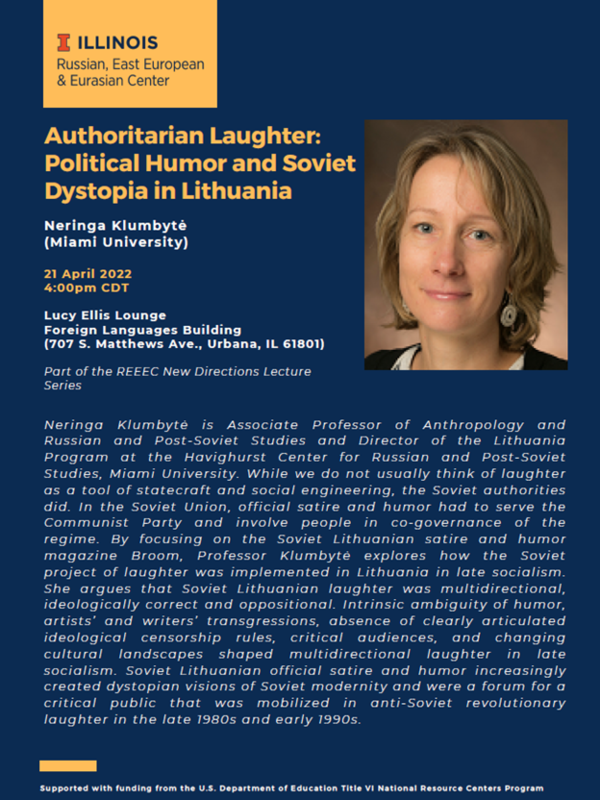REEEC New Directions Lecture: Neringa Klumbyte, "Authoritarian Laughter: Political Humor and Soviet Dystopia in Lithuania"

- Sponsor
- REEEC
- Speaker
- Neringa Klumbytė (Associate Professor of Anthropology and Russian and Post-Soviet Studies and Director of the Lithuania Program at the Havighurst Center for Russian and Post-Soviet Studies, Miami University)
- Cost
- Free and open to the public.
- Contact
- REEEC
- reec@illinois.edu
- Views
- 319
While we do not usually think of laughter as a tool of statecraft and social engineering, the Soviet authorities did. In the Soviet Union, official satire and humor had to serve the Communist Party and involve people in co-governance of the regime. By focusing on the Soviet Lithuanian satire and humor magazine Broom, Professor Klumbytė explores how the Soviet project of laughter was implemented in Lithuania in late socialism. She argues that Soviet Lithuanian laughter was multidirectional, ideologically correct and oppositional. Intrinsic ambiguity of humor, artists’ and writers’ transgressions, absence of clearly articulated ideological censorship rules, critical audiences, and changing cultural landscapes shaped multidirectional laughter in late socialism. Soviet Lithuanian official satire and humor increasingly created dystopian visions of Soviet modernity and were a forum for a critical public that was mobilized in anti-Soviet revolutionary laughter in the late 1980s and early 1990s.
Neringa Klumbytė is Associate Professor of Anthropology and Russian and Post-Soviet Studies and Director of the Lithuania Program at the Havighurst Center for Russian and Post-Soviet Studies, Miami University. Her research and teaching interests center on the USSR, Russia and Eastern Europe. Her articles have explored various topics in Soviet or post-Soviet Lithuania, including politics of memory and historical justice, ethnic conflict and nationalism, political participation in authoritarian and democratic regimes, populist electoral politics and nostalgia for socialism, censorship, and political marketing. She is a co-author of Social and Historical Justice in Multiethnic Lithuania (2018, with Monika Frėjutė-Rakauskienė, Andrius Marcinkevičius, and Kristina Šliavaitė, in Lithuanian) and co-editor of Soviet Society in the Era of Late Socialism, 1964–85 (with Gulnaz Sharafutdinova), 2012. Her book Authoritarian Laughter: Political Humor and Soviet Dystopia in Lithuania is forthcoming with Cornell University Press.